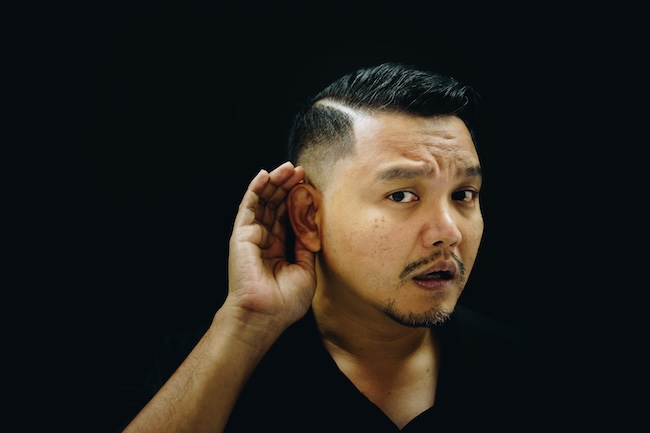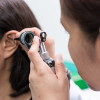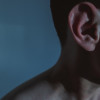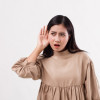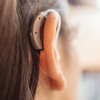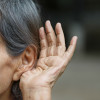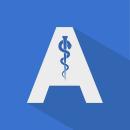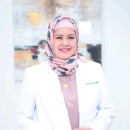Early onset presbycusis atau presbikusis awitan dini adalah suatu kondisi dimana age-related hearing loss (ARHL) bermanifestasi pada individu di bawah usia 65 tahun. Faktor yang berkontribusi terhadap fenomena ini diduga mencakup kecenderungan genetik, pengaruh lingkungan, dan gaya hidup.[1-3]
Kemungkinan Penyebab Awitan Dini Presbikusis
Gangguan pendengaran sensorineural yang disebabkan oleh faktor luar, seperti paparan kebisingan di awal kehidupan, dapat mempercepat awitan timbulnya age-related hearing loss (ARHL). Penelitian mengatakan bahwa paparan bising dapat memperburuk atau mempercepat patomekanisme terkait ARHL, termasuk presbikusis. Ini mencakup peningkatan reactive oxygen species (ROS), disregulasi antioksidan endogen, dan disfungsi vaskular akibat peningkatan ekspresi dari hipoksia faktor 1 alfa.[1]
Presbikusis adalah penurunan dari pendengaran yang terkait dengan disfungsi akibat penuaan. Presbikusis biasanya timbul pada seseorang setelah dekade ke-5 kehidupan, dimana lebih dari 75% kasus muncul di atas usia 55 tahun. Dalam studi eksperimental pada hewan coba, didapatkan bahwa paparan suara keras dapat memperburuk proses penuaan dan membuat struktur koklea lebih rentan terhadap proses penuaan, menyebabkan presbikusis timbul lebih cepat dari waktu tradisionalnya.[1-4]
Gejala klinis presbikusis awitan dini adalah serupa dengan ARHL tradisional. Ini mencakup kesulitan memahami pembicaraan di lingkungan yang bising, rasa suara teredam, dan kesulitan membedakan suara bernada tinggi. Meski demikian, penting untuk dicatat bahwa implikasi penurunan pendengaran pada individu yang lebih muda juga lebih luas, termasuk kesulitan dalam lingkungan profesional dan interaksi sosial.[1-3]
Faktor Risiko yang Mempengaruhi Onset Presbikusis
Early onset presbycusis atau presbikusis awitan dini mengacu pada terjadinya ARHL pada individu yang lebih muda dari rentang usia khas yang terkait dengan kondisi ini. Meskipun usia menjadi faktor signifikan untuk presbikusis, beberapa faktor risiko tambahan dapat berkontribusi pada perkembangan presbikusis dini.[1-4]
Faktor Genetik
Faktor genetik yang dapat mempengaruhi awitan presbikusis adalah kelainan pada gen yang terlibat dalam fungsi koklea. Komponen genetik yang berpengaruh belum sepenuhnya diketahui, tetapi dianggap berkontribusi membuat sel-sel sensorineural organ pendengaran menjadi lebih rentan terhadap kerusakan. Faktor genetik diperkirakan berkontribusi 40% hingga 70% terhadap timbulnya ARHL meskipun pada orang dengan gaya hidup yang baik.
Beberapa gen kandidat yang diduga berkaitan dengan kerentanan ARHL adalah ACVR1B (activin receptor type 1B) dan GSTM1 (glutathione S-transferases).[5-7]
Faktor Lingkungan
Kebisingan yang bersifat kronik berkontribusi paling besar terhadap perkembangan ARHL. Paparan kronis dari kebisingan menyebabkan kerusakan mekanis pada sel-sel rambut koklea.
Selain itu, faktor lain yang juga berkontribusi adalah gaya hidup, seperti pola makan dan merokok, yang dapat menyebabkan penyakit kronis seperti diabetes dan gangguan kardiovaskular yang juga meningkatkan risiko gangguan pendengaran.
Faktor lain adalah konsumsi obat yang bersifat ototoksik. Contohnya adalah antibiotik aminoglikosida seperti gentamicin dan diuretik seperti furosemide. Gangguan pendengaran juga dapat disebabkan oleh cedera neurovaskular akibat penyakit kronis, seperti hipertensi, yang dapat mempengaruhi fungsi dari koklea atau saraf pada koklea.[5-7]
Penanganan Early Onset Presbikusis
Sama dengan prebikusis tradisional, tidak ada terapi definitif yang bisa menghilangkan early onset presbycusis atau presbikusis awitan dini. Perawatan konvensional yang sudah hadir untuk mengatasi presbikusis adalah penggunaan alat bantu dengar atau dengan implan koklea. Namun, pendekatan ini memiliki keterbatasan sehingga alternatif strategi terapi yang lain sedang diteliti.[1]
Penelitian praklinis pada hewan sedang mengevaluasi keamanan dan kemanjuran obat baru, seperti N-acetyl cysteine dan resveratrol, untuk mencegah atau menunda timbulnya ARHL. Beberapa pendekatan dengan medikamentosa lain, terapi nutrisi, dan terapi gen juga saat ini sedang dipelajari potensinya.
Karena penurunan sistem antioksidan seluler diduga berperan dalam mekanisme timbulnya ARHL, mengurangi stres oksidatif diharapkan dapat mencegah dan mengobati ARHL. Pada suatu studi kecil pada manusia, pemberian kombinasi dari antioksidan, berupa multivitamin dan asam lipoat, telah menunjukkan efikasi dalam memperlambat perkembangan ARHL.[7]
Kesimpulan
Early onset presbycusis atau presbikusis awitan dini merupakan suatu kondisi dimana age-related hearing loss (ARHL) terjadi sebelum usia umum timbulnya kondisi ini, yakni di bawah 65 tahun. Awitan dini presbikusis diduga berkaitan dengan adanya paparan bising pada awal kehidupan. Faktor genetik, merokok, penggunaan obat ototoksik, serta penyakit kronis yang mempengaruhi koklea atau saraf koklea, seperti hipertensi dan diabetes, juga meningkatkan risiko mengalami presbikusis dini.
Serupa dengan presbikusis pada usia tradisional, tidak ada terapi definitif yang bisa menghilangkan presbikusis dini. Penggunaan alat bantu dengar atau implan koklea bisa membantu meningkatkan fungsi pendengaran dan kualitas hidup, tetapi pendekatan ini memiliki banyak keterbatasan, termasuk biayanya yang tinggi. Saat ini, berbagai alternatif terapi lain sedang diteliti untuk mencegah atau mengobati presbikusis.




